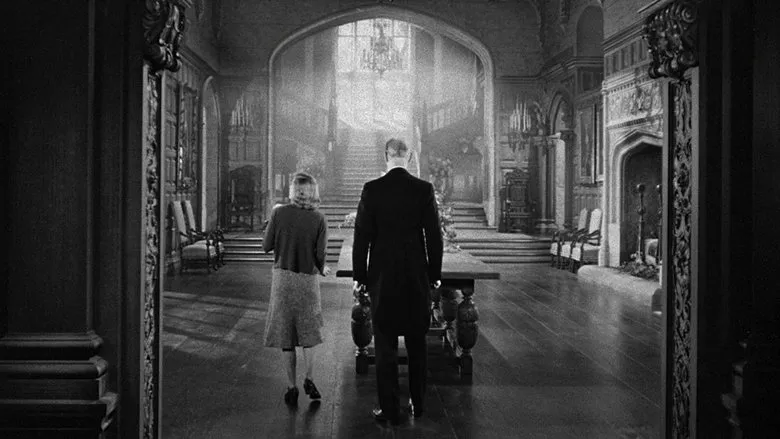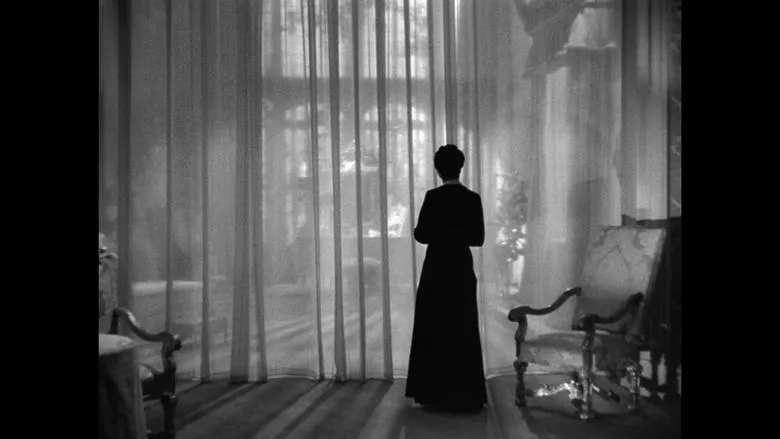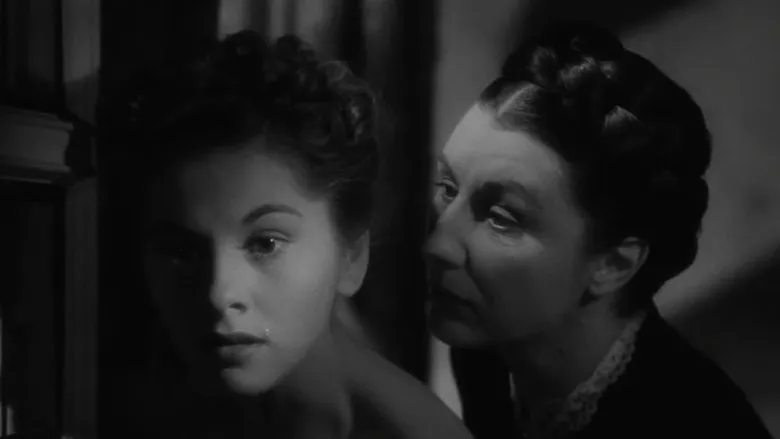A young woman, serving as a companion to a wealthy and quarrelsome lady, meets Maximillian de Winter, a rich and handsome gentleman, while vacationing in Monte Carlo. His beloved wife Rebecca died a year ago, and he still cannot recover. Nevertheless, he becomes interested in the girl, and after a couple of days—to prevent her from leaving—he proposes. The new Mrs. de Winter arrives at his Manderley estate, where the servants greet her rather hostilely, never missing an opportunity to remind her how inferior she is to the deceased Rebecca. Whose death, by the way, turns out to be much more mysterious than it seems at first glance.

Kristin Scott Thomas as Mrs. Danvers and Lily James as Mrs. de Winter
Rebecca: A Remake or a Reimagining?
Despite Ben Wheatley’s insistence that his “Rebecca” is not a remake of Hitchcock’s film but an independent adaptation of Daphne du Maurier’s novel, the influence of the master of suspense is evident. It’s there in the style, in the intonation, and, for example, in the choice of Kristin Scott Thomas for the role of Mrs. Danvers (who bears a striking resemblance to Judith Anderson from the 1940 film). Obviously, trying to replicate Hitchcock is a losing proposition from the start, unless you’re, say, Brian de Palma. But that’s not even the main problem. If you’re going to imitate Hitchcock, why choose “Rebecca” of all his films—a movie that is not only far from the best in his filmography but also hopelessly outdated morally? Imagine, in 2020, Netflix releases a film where a man kills his wife out of jealousy, and he’s portrayed as a positive character. And the only character with a hint of non-traditional orientation is the main villain, whose motivation is entirely based on her possible homosexuality.

Armie Hammer and Lily James in a still from “Rebecca”
Missed Opportunities for a Modern Lens
One would have rightly expected the new adaptation to apply a new perspective, a 180-degree turn in relation to the central conflict. But Wheatley follows the well-trodden path of Hitchcock, not noticing that it has been somewhat obscured by time. He seems more interested in recreating the saccharine aesthetics of Monte Carlo and the opulent life of a now-lost Europe than in actually working with the text of “Rebecca.” Yes, the actors try their best, and the art department and costume designers had room to roam, but it’s so boring and lifeless. Moreover, despite the abundance of colors, it somehow looks much grayer than Hitchcock’s black-and-white film. Ben Wheatley is clearly not at home in this aristocratic world; he’s a director of grounded films about pagan cults (“Kill List”) and soldiers who have overdosed on psilocybin mushrooms (“A Field in England”), but not costume melodramas.
 .jpg)
.jpg)
Lily James and Armie Hammer in a scene from “Rebecca”
A Glimmer of Wheatley’s Genius
Only in one scene, where Lily James’s character seems to completely lose touch with reality, does Ben Wheatley recall his favorite techniques—sharp, disorienting editing, uncomfortably close-ups with wide lenses. It’s as if he’s winking at his few fans: “I’m here, surrounded, but not broken.” And in the end, it only makes you dream: “What if the whole film was like that?” If the Hitchcockian suspense in all of “Rebecca” had been replaced by Wheatley’s madness, his ability to cinematically convey the feeling of absolute incomprehension of what the hell is going on around, after all Mrs. de Winter is just as lost a character as the heroes of his “Kill List” or the criminals cornered in “Free Fire”. And if he had applied the same directorial tools to her story, it would have been at least interesting and, of course, very bold. But the new “Rebecca,” like the new Wheatley, is anything but bold.
A Tragedy of Lost Potential
The main tragedy of the film is not at all in the story of a Cinderella trying to fit into a hostile world. And not even in the drama of a lesbian couple forced to hide their love and therefore embittered against everyone around them. It is the tragedy of a director, one of the most interesting in the 21st century, who, after a series of financial failures, is forced to retrain as a boring craftsman, to exchange a unique authorial style for good budgets and a comfortable life. Once, the first “Rebecca” became one of the most important films on Alfred Hitchcock’s path to the Hollywood Olympus, giving him his first Oscar nomination and the favor of producers. The new “Rebecca” serves as little more than the first line in the epitaph of Ben Wheatley—who made crazy, unique films, and now directs a new “Lara Croft” and a sequel to “The Meg,” where Jason Statham fights a giant shark.